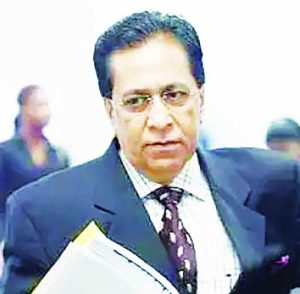…chances of EPA’s appeal succeeding is like a “snowball in hell fire”— respondents’ lawyer
Justice Sandil Kissoon’s order for ExxonMobil to provide unlimited parent company guarantee for its and its co-venturers oil operations offshore in the Stabroek Block in the event of an oil spill “makes a mockery” of the 2022 Environmental Permit granted to that American multinational company by the Environmental Protection Agency (EPA).
This has been the position advanced by EPA’s lawyer Sanjeev Datadin as he argued why the agency’s

appeal against Justice Kissoon’s ruling has a reasonable prospect of success.
In a May 3 judgement, Justice Sandil Kissoon, among other things, directed the EPA to issue Exxon’s local affiliate, Esso Exploration and Production (Guyana) Limited (EEPGL), with an Enforcement Notice on or before May 9, for the company to provide, within 30 days, an unlimited parent company guarantee agreement and/or unlimited liability affiliate company guarantee, together with environmental liability insurance, as is customary in the international petroleum industry.
Non-compliance would result in suspension of the permit. The oil company has until June 8 to conform, since it has already been issued with the notice.
Mockery
Datadin, in his arguments, said that this case relates to the statutory interpretation of the Environmental Permit.
“This is a simple issue of interpretation. The existence of insurance has never prevented something from happening. Insurance is to compensate when the event occurs. The insurance will only be applicable whenever the ill befalls. All that the guarantee will try to do is make it right after the fact”.

Sanjeev Datadin
He argued that Justice Kissoon considered “extraneous matters” when arriving at his decision, in particular that order. “Unlimited guarantee makes a mockery of the clear words in the permit”, Datadin submitted, adding that the permit refers to a “fixed sum”, and not an unlimited guarantee. To speak of the guarantee as a protector of an event befalling is erroneous, Datadin added.
Reliance of the respondents — President of the Transparency Institute of Guyana Inc (TIGI), Fredericks Collins, and Guyanese citizen Godfrey Whyte — on the argument of an unbalanced contract between Exxon and the Government, Datadin argued, is of no importance to this matter.
“If you’re unhappy with the contract”, there are other things that can be done, he pointed out.

In further arguing his case, the EPA counsel contended that since an unlimited guarantee does not exist in the permit or Environmental Protection Act, the lower court fell into error.
Datadin further added, “Unlimited has come about through a misinterpretation. The court has invented an unlimited guarantee…and [held] this incorrect interpretation as a weapon…”
By making such a coercive order, Datadin said, Justice Kissoon usurped the functions of the EPA under the Act and bypassed all the other options available.
“The court is now performing the functions of a statutory body [EPA].”
In public law, he noted, the court does not interfere with the discretion given to State entities, but rather examines whether this discretion is being exercised in accordance with applicable laws. He therefore questioned where is Esso’s “right to be heard”.
“And if you don’t comply [with the order] Esso is out… shut down the wells, fire the employees…,” added Datadin who maintained that the EPA has an arguable case.












